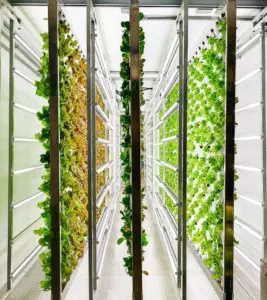 Vertical Hydroponics is needed – We face multiple agriculture-related obstacles in the fight to feed the world’s increasing population: climate change, lack of farmable space, water usage, supply chain concerns, and food contamination.
Vertical Hydroponics is needed – We face multiple agriculture-related obstacles in the fight to feed the world’s increasing population: climate change, lack of farmable space, water usage, supply chain concerns, and food contamination.
Climate Change
We all know that climate change is causing increasing temperatures across the globe. Another unfortunate but less talked about issue caused by higher temperatures is an increase in pests. Our farms are built inside sturdy, insulated shipping containers, making them immune to the weather unpredictability and pest infestations that plague traditional farming.
Available Space
The UN reports that by 2050, the world’s population will reach nine billion, and food production will need to increase by seventy percent. To meet this increase in food production, farmers will need more land, but there is unfortunately not enough farmable land to meet this need. Hydroponic vertical farms can be placed in nearly any location and are stackable for added efficiency. Inner cities, drought-stricken areas, places with extreme temperatures, and hard to reach locations are not an issue for these types of farms.
Water Usage & Contamination
Traditional agriculture is the number one user of the Earth’s freshwater. A NASA report states that the demand for freshwater will increase by 55% by 2050. Water shortages are already a concern in the United States as well as in developing countries. These shortages will only get worse as many areas continue to suffer from widespread and long-lasting droughts. Vertical farming drastically reduces the amount of water needed to grow crops — FarmBox Foods’ innovative, closed watering system only uses 3-5 gallons of water per day and does not contribute to groundwater contamination.
Supply Chain Concerns
Our farms can be placed near distribution centers, schools, grocery stores, and shelters. By using a farm-to-table approach, produce from the farm can be served at your table the same day it is harvested. Not only does this allow the plants to keep all of their nutrients, but it cuts down on plastic packaging and transportation costs. Food Safety Studies show that foodborne illnesses sicken 1 in 10 people across the globe and kill 420,000 people every year. Some causes of foodborne illness include bacteria, viruses, chemicals, parasites, and cross-contamination.
Food Safety
is a top priority at FarmBox Foods. We have multiple systems in place to ensure that only clean water reaches the crops, and we have procedures in place to prevent other types of contamination.
Smart Farm Technology gives the farmer complete control over temperature, humidity, LED growing lights, and watering schedules. The ability to make adjustments as needed not only increases plant growth but gives consistency in plant production. Our farms are only 320 square feet, stackable, and compatible with nearly any environment. Low water usage and multiple filtration systems mean our farms only require 3-5 gallons of water per day, with no worries about contamination. We believe that this combination of innovation, creativity, and sustainability makes vertical hydroponic farming the future of agriculture.
